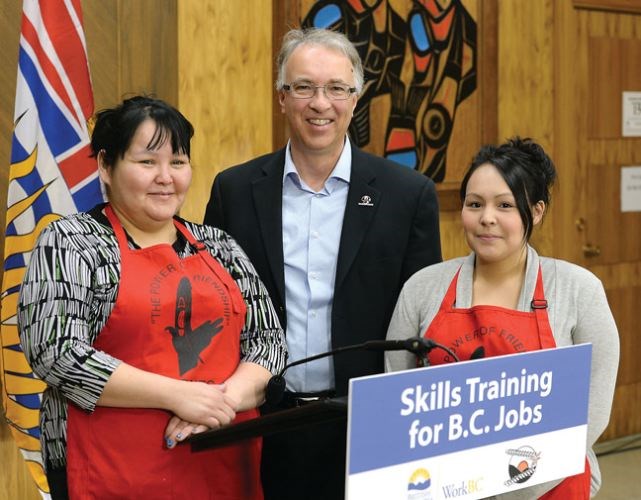According to Minister John Rustad, 75 per cent of First Nations residents do not live on a reserve and many don't live on their traditional territory.
As Minister of Aboriginal Relations and Reconciliation, he didn't want that population missed when his skills training budget was spent.
On Friday, Rustad unveiled a plan to put significant money in the hands of urban aboriginal trainers.
Most of the recent training money for aboriginal people had been directed towards individual First Nations or specific education facilities. This was broad based, it was worth millions of dollars, and it capitalized on agencies already delivering this kind of service at Native Friendship Centres.
The announcement was made at Prince George's NFC.
The push towards aboriginal employment has been linked heavily to the liquefied natural gas industry (LNG) especially since the proposed projects require long pipelines that cross dozens of northern First Nations.
Part of the rent on that land usage, according to virtually all the affected First Nations, is certified employment education for their people.
"Whether liquefied natural gas comes along or not, we need to fill jobs," said Rustad, so these training programs aimed at urban aboriginal people will provide them with "transferable skills that will lead to so much more."
The provincial government calculated the need for skilled employees, in the next couple of decades, and set a goal of 15,000 aboriginal workers to fill the coming vacancies.
A thousand of those will be trained in the next three years directly through the $2 million earmarked on Friday.
"There are few more critical files," than filling the generations-old gap in aboriginal employment, said Shirley Bond, the minister responsible for jobs and labour, who also attended the announcement.
"When 75 per cent of aboriginals live off-reserve, our programs must reflect that - programs that are innovative, creative and culturally appropriate."
With some of the LNG opportunities expected to come to decision in the next 10 months, these programs had to be underway soon but, said Bond, this funding is not tied to the LNG industry.
"No matter how much economic growth we have - and we are leading Canada - we have two-thirds of our workforce leaving their jobs because we are aging," she said.
"So we need people. A lot of people. It is the right thing to do to make sure aboriginal people are at the front of the line with all B.C. people to take on those employment opportunities."
Bond said the Prince George NFC had a respected reputation across Canada, "we are so proud of this place," so it was gratifying to unveil this part of the aboriginal education funding strategy within those walls.
Rustad said "we knew from the beginning of our strategizing that we had to factor in the urban indigenous population, not just those living on reserves, and we knew that native friendship centres were established delivery centres already for skills training programs. We aren't, as a government, saying 'we want to train 100 pipe fitters and 100 millwrights, so let's do that with aboriginal people.' We are working with First Nations, one by one, to tailor the training that will be applied to their own specific needs. Now we are adding the people touched on by native friendship centres in the urban setting."
Barb Ward Burkitt is the general manager of the Prince George NFC. "We are ready to take this on because we have already been doing it, for years."
The executive director of the BC Association of Aboriginal Friendship Centres agreed. Paul Lacerte, originally from the Fraser Lake area, said this money was welcome in his home region.
"The BCAAFC has partnered with the B.C. government ensuring that urban aboriginals in B.C.'s north have the opportunities and skills needed to participate in the wide range of jobs that will benefit all of our communities.
"This skills training project will help do that...We see this as a time of renewed commitment to aboriginal people living in B.C.'s north."



